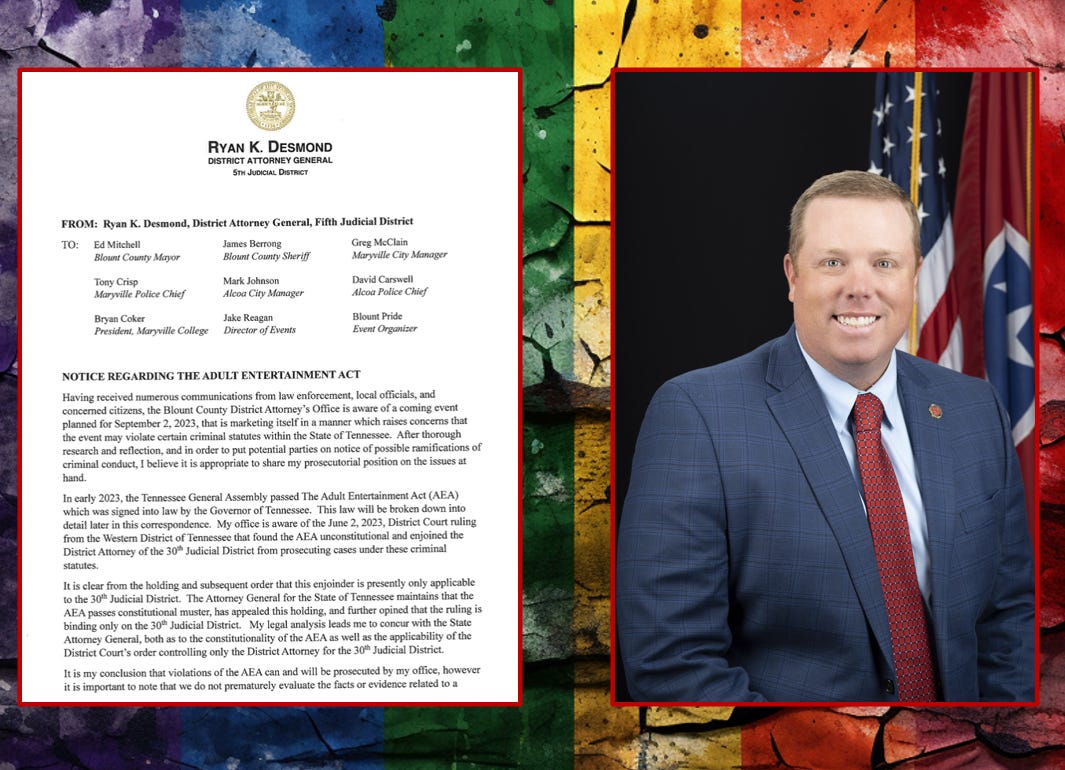Tennessee Prosecutor Threatens To Arrest Pride Organizers, Court Fight Begins
A prosecutor in Blount County, Tennessee has threatened Pride organizers with an anti-drag law found unconstitutional. In a court filing, leaders at Maryville College were threatened with arrest.
On April 1, 2023, Tennessee's anti-drag law took effect, banning "male or female impersonators" from performing in public spaces. A U.S. District Court judge promptly blocked the law, stating it was specifically designed to stifle constitutionally protected speech and ultimately ruling it unconstitutional. Despite the judicial ruling, a Tennessee District Attorney, Ryan Desmond, threatened Pride organizers in Blount County with arrest under the now-unconstitutional provisions, arguing the ruling "does not apply" to his office and district. Now, a showdown is underway, with organizers filing a court challenge as the September 2nd date of the event fast approaches.
Blount County, a county located just outside of Knoxville, Tennessee, has held an annual pride event for the last three years at Maryville College. The event is open to all without age restrictions, as most Pride festivals in the United States are. Upon learning that there would be drag artists at the Pride festivities, the prosecutor sent out a letter stating that holding the festival could result in criminal prosecutions. In private conversations with organizers and school officials, he stated that even the president of the college could be targeted under the new law, which specifies arrest with up to a year in jail for the first offense.
See the letter sent here:
The letter appears to reject the idea that a law found unconstitutional by a federal court applies to his district. Though the letter claims that the ruling is limited to the 30th district, precedent demands that when a court rules a law unconstitutional and enjoins an agent of the state from enforcing it, other agents of the state are similarly barred from enforcing it - see, for instance, Will v. Michigan Dept. of State Police, which stated, “[A] suit against a state official in his or her official capacity is not a suit against the official but rather is a suit against the official's office... [a]s such, it is no different from a suit against the State itself.” Denying this precedent would mean that a state could simply relitigate the case by repeatedly switching districts and offices enforcing a law.
Blount Pride organizers quickly mounted a response. The ACLU of Tennessee immediately filed a lawsuit, stating that the threat of enforcing the law against Blount Pride “amounts to a harmful attempt to remove LGBTQ+ people from public life.” They also announced that the Pride events would still proceed as planned on Saturday, though “there are concerns that things might change.”
The lawsuit itself comprises 26 pages and alleges that Desmond specifically sent the letter to prevent the Pride event from happening in an attempt to target their constitutional protections around freedom of speech. It outlines a series of steps that Desmond’s office took targeting organizers, the college, and drag artists in the area. Specific allegations include intimidating phone calls to Pride officials, college administration, and law enforcement officers in the area.
See some of the allegations here:
During the legislative debate over anti-drag laws, opponents specifically highlighted the potential impact on Pride events. When questioned about the bill by Sen. Akbari on Feb. 9, the bill's sponsor, Sen. Johnson, contended that "anyone can hold an event," but added that children shouldn't attend (see legislative video record at timestamp 30:49 onward). While some Republicans accused Democrats of exaggeration in claiming the bill targeted Pride events, Sen. Yard later remarked, "Even if the sponsor doesn't intend to go after all these people, we know that the enforcement will be different” (35:28). This observation proved prescient, given subsequent enforcement actions.
Recent months have seen an uptick in the enforcement of laws targeting Pride events. In Florida, the Treasure Coast Pride parade was canceled due to the state's anti-drag law. Similarly, Helena Pride in Montana nearly faced cancellation as organizers scrambled to comply with that state's anti-drag legislation. Both states eventually had their anti-drag laws struck down in court, much like Tennessee. However, Tennessee stands out as the first state attempting to enforce such a law despite a judicial ruling declaring it unconstitutional.
As the Sept. 2 date for the Pride event in Blount County looms, a court ruling on the filed lawsuit is expected imminently. Should a judge deny the organizers' request, key participants—including organizers and artists—risk arrest. For those who advocate for LGBTQ+ rights, attention will be riveted on Blount County this weekend, watching for a moment that could stand as either a wonderful victory asserting LGBTQ+ rights or a shameful and defining milestone in the wave of anti-LGBTQ+ government hostility characterizing 2023.





This is why I’m glad to donate to the ACLU every month. This is so ridiculous and as simple as this should be to resolve, it depends more on how corrupt those involved are rather than what’s actually legal
Blount knows he will lose legally. He is simply playing the bully and trying to intimidate the organizers and college officials into canceling the event. This is why we must stand up and push back on our oppressors, wherever and whenever they appear.